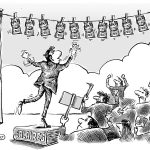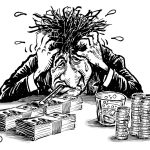The vaccination against the recession…
The imminent deployment of the anti-Covid vaccines raises high economic expectations. Are they exaggerated?
The imminence of the anti-Covid vaccine has already boosted stock markets and generated a great sector rotation. The foreseeable end to the pandemic has rejuvenated confidence, both at the level of public authorities and private activities. In short, the light is visible at the end of the tunnel and we want to reach it with a euphoric impatience. In addition, I share completely this feeling. The promise of a resumption of mobility and therefore of trade is conditioned by the resumption in trust and confidence. This “animal spirit” underpins the sustainable rebound in the economic activity. We know it well enough; confidence is the engine of growth at all times and in all places.
So why spoil the party? This is not our intention. However, we can only be cautious, if not circumspect, because the consequences of the crisis may affect us for a long time to come.
The vaccine is there, and the means promised to acquire it and distribute it to as many people as possible are important. But will all countries benefit simultaneously? Even under the best logistical conditions, it will take several more months before the critical threshold of collective immunity is reached … Not to mention the hesitation of the population. A recent survey by the World Economic Forum1 underlines a growing reluctance of people to be vaccinated. Across the world, a majority are worried about the lack of hindsight in clinical trials and therefore the risk of significant side effects that may go undetected. This reluctance, as we know, varies greatly from one country to another: nearly two-thirds of Mexicans and Chinese are determined to be vaccinated within three months of being placed on the market, while less than 40 % of French and Spanish people are ready to take the same path as quickly.
As barriers are removed, countries will need to be both more parsimonious and more generous.
Economically, the consequences of the crisis will not go away as quickly as one might hope. The OECD has just revised its growth forecasts upwards very cautiously. In its December report, aptly titled “Making Hope a Reality” 2, the Organization expects a “return to normalcy” by 2022. However, the aftermath of the crisis threatens to persist: in 2022, the unemployment rate in member countries may well remain above its 2019 level. The general deterioration in public finances will continue to weigh on the recovery. The increase in debts – even largely relieved by the intervention of central banks – will force the most exposed countries to gradually to put their accounts in order. Quite logically, as growth takes over, fiscal and monetary resources will shrink. The question is, however, when and to what extent this support can be withdrawn without risking a relapse into activity. In other words, when it comes down to market forces to sort out viable businesses from the zombies one, will the economic and social bedrock be strong enough to absorb the shock of the change already at work and which the pandemic has accelerated? The underemployment which threatens to remain high and persistent uncertainty about the opening of borders, will weigh on certain sectors and countries for a long time, weakening the most precarious among us. From a health perspective, the risk of a third wave, or other aftershocks such as mutations in the virus, cannot be ruled out. It is, therefore, not impossible that we are witnessing a halting and disparate accordion-like recovery.
As barriers are removed, countries will need to be both more parsimonious and more generous: more precise and effective targeting in the direction of the most vulnerable will have to be clearly translated into a further reduction in poverty. While climate and biodiversity issues are now better recognized, society struggling for productivity will certainly need to rely on enough latitude and flexibility to redeploy itself.
Published in French in allnews.ch on Dec 8th, 2020 Cartoon © Barrett
2 http://www.oecd.org/perspectives-economiques/



